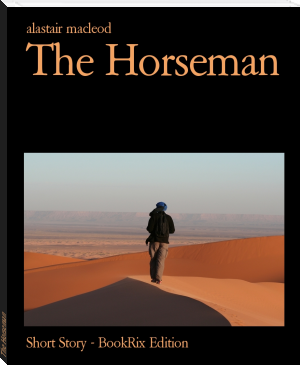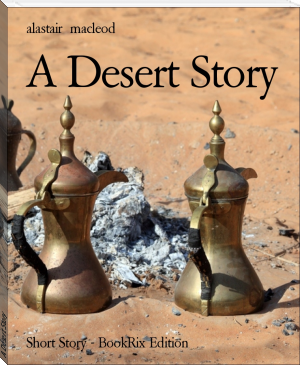The Horseman by alastair macleod (readict .txt) 📕

- Author: alastair macleod
Book online «The Horseman by alastair macleod (readict .txt) 📕». Author alastair macleod
"a personal journey"
At the University of Wisconsin I met a Syrian student, Fatima Sinani.
Almond shaped eyes with beautiful long dark lashes, deep pools of chocolate for pupils. Hair, thick and black, worn long. She was outspoken, full of an inner burning, for something, with anger at someone.
I too, was strong minded and opinionated. I had been in the marines, fought for my country, for democracy and for God.
But some of that had paled by the third tour. Although I had served in Iraq and in Afghanistan, the army had kept me separate from the people and the cultures we had invaded. I thought I knew who the good guys and the bad guys were. The wars left me fucked up. On that third tour I was on Prozac half the time. On leave I was a mess.
I got out and after a while doing nothing, I went to Combat Stress; they helped think things through. I had missed out on college by going to the army but it had given us some language tutoring and I seemed to have a natural facility.
Now out of the army with a severance payment I decided to take up Middle Eastern languages, become a mature student. I was twenty six.
I was studying Aramaic, the language of Christ.
As my relationship with Fatima deepened, she drew for me a Syria in which there was a tangled web of Sunni versus Shia, of Christian versus Moslem, of factionalism, and sectarianism.
Our course tutor had described Syria as a mosaic country with many minorities sheltering under the Assad regime.
Small groups had felt safe under it and were free to worship,
Zoroastrians, Druze, Sunni Arabs, but also Kurds, Circassians, Turkomans,
Alawi and Shia, also Arab Christians, Assyrians and Armenians.
But Fatima came to me with stories of repression. She said the Assads ruled like pharaohs and the population were their slaves.
Her father, she said, had been imprisoned. He had been a wealthy merchant and on his release he had fled to Lebanon.
He it was who sent Fatima to the States, to college.
I was fascinated by the complexities of Syria. To me, a farm boy from the
Mid-west, it seemed layered in oldness.
My course tutor had described how Syria had an ancient, ancient history, that like the lichens on a Scottish standing stone, its culture had grown on to it over millennia.
I had never heard of its third century Eblan civilisation, nor that Damascus
was the oldest continuously inhabited city in the world. I learned of the
Ottoman Empire and of the Umyyad Caliphate, and its links with Egypt and
the Mameluks.
Fatima talked to me of the crusades, of Saladin’s castle near Latakia and the crusader castle of Krak de Chevalier at Homs and of the Assassin sect. The country, and she, merged in my mind into a rich fantasy.
In the third year I was approached by a lecturer who asked if I would like to study in Syria for at least two semesters. He said there would be an orientation course before I went. Fatima was pleased. She encouraged me. She said it was important for our relationship that I knew about her country.
At the Institute for Foreign Affairs they grilled me not on my academic work but about my family, my beliefs, my attitudes. They used complicated questions to elicit nuanced feelings on issues. In front of them they had a pile of files on me including my military records - where had they got those?
The second day was orientation all about Syria, the politics, the economy, the Assad regime (all negative) and the opposition to it (mostly all positive).
Then I was sent to communications. Like any young man I was familiar with Iphones and Ipads but it was here that I began to realise that another goal was being grafted into my study trip.
I was being recruited for a soft war against the regime. They showed me how to hack the internet, to introduce worms into software, how to switch phones to avoid tracking and detection.
I was to encourage dissent amongst the population, seek out potential leaders, select them from bloggers and internet sites. When I returned home after this intense week I was eager to tell Fatima. She was pleased with what I could relate. She fervently wanted to get back at the Assad government.
My course tutor unaware of this other dimension to my study tour helped me prepare resources for my Aramaic project, which I now knew to be a cover.
He had gotten extra funding from the American Bible Society. Since Jesus spoke Aramaic as his first language they were only too keen to promote its survival. Fatima would not be able to come. It was too dangerous, she said, for her to return.
And so I found myself 45 miles from Damascus in Maaloula, an isolated village in a cleft of the Kalama Mountains. It was a place of strange contrasts. While all the population spoke Aramaic only half were Christian and I awoke each day to the sound of collared doves and the muezzin.
I was working with Father Sergius and a Nunnery school at the Church of the Blessed Mary. My student project was to help to produce materials to turn the now only spoken language of Aramaic into a script to be written and read on a daily basis by children and adults.
I waited a week to begin to contact dissidents on the phone. I had been given numbers. I was to encourage dissidents to demonstrate, show them how to blog, how to flash mob, put up anti-Assad websites. That’s how it started.
After two months I received instructions to provide guerilla warfare instruction to groups in Damascus. My research visa allowed for me to visit the library in Damascus and the university. Here I met dissident students and rebels, and in a back street garage, I ran courses on tactics, in the use of bombs, antitank missiles, mortars, and rocket launchers. The weapons they had were supplied via a third party with origin signs removed, but I could tell they were standard US issue with some AK 47’s from the Pakistan border workshops.
I began to feel quite schizophrenic - one minute I was immersed in ancient Aramaic script, writing text books, next minute I was running a class on street warfare.
At the nunnery they were anxious about the unrest. Under Assad they felt safe. The rebels were anti-Christian and began to commit atrocities.
I found the rebels fanatical, without any moral borders to their actions. After the Houla Massacre one of them said to me, “the end justifies the means.”
I had believed I was helping to bring democracy but I was a helping an extremist religious sect to get into power and then come down hard on minorities. I began to have days of doubt. Was I doing the right thing? In my ancient bible texts Jesus spoke of love for all mankind.
What was I doing promoting sectarianism?
At Mazrat-Al-Qabeer one of the rebel groups I had trained committed another terrible atrocity. I was shaken, my face ashen that night when I returned to the Nunnery school. In the massacre women and children had been disfigured, their bodies abused before death. There was talk of the Assassins.
I told my handler at the embassy I was finding it hard to continue. He gave me the line about freedom of expression, democracy and I countered him.
That was my undoing. A day later I received an email urging me to come home. It was from Fatima.
It was then I realized she was working for them, for the US government; she was a recruiter.
I felt sick. The whole relationship was false.
I decided to go over to the other side.
But how? Would I not just be always totally suspect by them?
I stopped my classes to the rebels. For a while they pleaded with me to give them more advice and direction. I said I had been ordered not to; that I was working on something bigger.
I conceived a plan to subvert the subversives. To give false info to them and incomplete training. But my side had tipped someone off.
One day a vehicle came to the nunnery. I was in the chapel working on a text. Two US marines from the embassy entered and manhandled me towards the embassy car.
Father Sergius came out of his house and guessed something was up.
When he challenged them, for a second the marines let go of my arms and I was off, dodging through the little streets of Maaloula.
I soon lost them and made for the hills that surrounded the town.
I was on the run from my own government and from the rebels.
On the bare upper slopes, as night was closing in, a shepherd fed me and shared his mint tea.
He said men often hid in the hills from this faction or that.
Who was I now? A man without a state, without a relationship, without a philosophy.
We sat round his small fire, the bells of the sheep tinkling gently close by in the shadows.
It was then he told me the story of “the horseman and the snake."
“A man falls asleep on the ground, and snake enters his open mouth and slithers down into his stomach.”
I saw in my situation the snake, the US, creeping into any hollow it could in a regime.
“A passing horseman, seeing what happened,” he continued, “took his whip and beat the man until the snake slithered out of the man, for the horseman had seen this happen before in his own country.”
"And what happened to the man?" I asked
“That man did not sleep with his mouth open any more but wore a turban with a mouth cloth- he became a Bedouin, beholden to no one.”
The shepherd poked his brushwood fire.
“There is a Bedouin camp five miles south of here, go, speak to Sheik Al Ow’t, say you came from the horseman and you flee the snake, he will understand.”
The next day, with a water bottle he kindly offered me, I walked south, into the desert, until I spied, far off, black tents, like beetles on the desert floor. I speak some Arabic and Aramaic and a little Turkish so when challenged by a fierce looking tribesman I was able to answer and demand to see the sheik.
“So you come from the horseman and you flee the snake;
then welcome, we have all experienced the snake here.”
I was given food and drink.
”We will hear your story.”
When I had told my tale, the sheik began,
Sheik Al Ow’t
“The horseman and the snake is an old story and provokes much discussion,” he said, putting the tips of his fingers together.
“The horseman has not only seen the snake enter but knows how to remove it. The swallower can be any of us, unaware of a danger, asleep in our lives.”
He adjusted his robes.
“Some say Assad is the snake and some say that the US is the horseman.
But from what you reveal the US is the snake and Assad the horseman.”
He paused for a moment.
“We…” and here he swept his hand round the assembled company, “have learned to keep our mouths shut and covered with a cloth to keep out the snake.”
And they laughed.
And so now I, a man without a state, remain with The Bedou and we wander... …. wander across hills and rivers and desert, and across the borders of countries.
notes:
Prozac: anti-depressant given to troops.
Combat Stress; a counselling and support group for US soldiers.
Aramaic: the day to day language at the time of Jesus ; now considered an endangered language.
Soft War: where support is given to insurgents with no direct intervention on their behalf.
Damascus: capital of Syria.
muezzin; in moslem countries the muezzin calls the faithfull to prayer from the top of the mosque.





Comments (0)